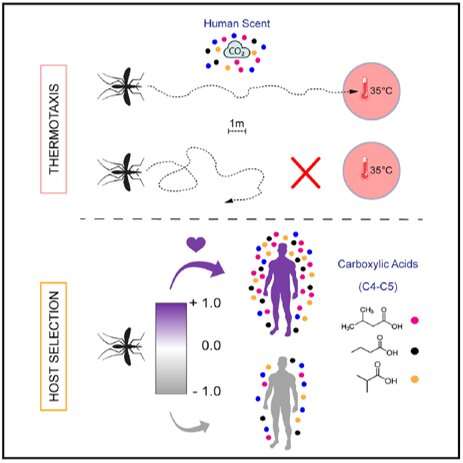This article has been reviewed according to Science X's editorial process and policies. Editors have highlighted the following attributes while ensuring the content's credibility:
fact-checked
peer-reviewed publication
trusted source
proofread
Researchers build mosquito testing arena to discover how they find us over long distances

We know a lot about mosquito preferences up close, but how do mosquitoes find us from up to a hundred meters away? Using an ice-rink-sized outdoor testing arena in Zambia, researchers found that human body odor is critical for mosquito host-seeking behavior over long distances. The team also identified specific airborne body-odor components that might explain why some people are more attractive to mosquitoes than others. The work appears May 19 in the journal Current Biology.
Most studies of mosquito preference have been performed in confined laboratory settings that probably don't represent a mosquito's experience in the wild. To test how the African malaria mosquito Anopheles gambiae locates and chooses human hosts over a large and more realistic spatial scale, researchers from Johns Hopkins Bloomberg School of Public Health's Malaria Research Institute and Macha Research Trust teamed up to build a 1,000 m3 testing arena in Choma District, Zambia.
"This is the largest system to assess olfactory preference for any mosquito in the world," says neuroscientist Diego Giraldo, a postdoctoral fellow at Johns Hopkins Bloomberg School of Public Health, one of the study's first authors. "And it's a very busy sensory environment for the mosquitoes."
The testing arena contained a ring of evenly spaced landing pads that were heated to human skin temperature (35ºC). Each night, the researchers released 200 hungry mosquitoes into the testing arena and monitored their activity using infrared motion cameras. Specifically, they took note of how often mosquitoes landed on each of the landing pads (which is a good sign that they're ready to bite).
First, the team compared the relative importance of heat, CO2, and human body odor for attracting mosquitoes. They found that mosquitoes were not attracted to the heated landing pads unless they were also baited with CO2, but human body odor was a more attractive bait than CO2 alone.
Next, the team tested the mosquitoes' choosiness. To do this, they had six people sleep in single-person tents surrounding the arena over six consecutive nights, and they used repurposed air conditioner ducting to pipe air from each tent—containing the aromas of its sleeping occupant—onto the heated landing pads. As well as recording the mosquitoes' preferences, the researchers collected nightly air samples from the tents to characterize and compare the airborne components of body odor.
"These mosquitoes typically hunt humans in the hours before and after midnight," says senior author and vector biologist Conor McMeniman, assistant professor at Johns Hopkins Bloomberg School of Public Health and Johns Hopkins Malaria Research Institute. "They follow scent trails and convective currents emanating from humans, and typically they'll enter homes and bite between around 10 PM and 2 AM. We wanted to assess mosquito olfactory preferences during the peak period of activity when they're out and about and active and also assess the odor from sleeping humans during that same time window."
They found that, night after night, some people were more attractive to mosquitoes than others, and one of the volunteers, who had a strikingly different odor composition from the others, consistently attracted very few mosquitoes.
The team identified 40 chemicals that were emitted by all of the humans, though at different rates. "It's probably a ratio-specific blend that they're following," says analytical chemist Stephanie Rankin-Turner , a postdoctoral fellow at Johns Hopkins Bloomberg School of Public Health, the study's other first author. "We don't really know yet exactly what aspect of skin secretions, microbial metabolites, or breath emissions are really driving this, but we're hoping we'll be able to figure that out in the coming years."
Though each person's odor profile varied from night to night, the researchers found some stable patterns. People who were more attractive to mosquitoes consistently emitted more carboxylic acids, which are probably produced by skin microbes. In contrast, the person who was least attractive to mosquitoes emitted less carboxylic acids but approximately triple the amount of eucalyptol, a compound found in many plants; the researchers hypothesize that elevated levels of eucalyptol may be related to the person's diet.
The researchers were surprised by how effectively the mosquitoes could locate and choose between potential human meals within the huge arena. "When you see something moved from a tiny laboratory space where the odors are right there, and the mosquitoes are still finding them in this big open space out in a field in Zambia, it really drives home just how powerful these mosquitoes are as host seekers," says Rankin-Turner.
More information: Conor J. McMeniman, Human scent guides mosquito thermotaxis and host selection under naturalistic conditions, Current Biology (2023). DOI: 10.1016/j.cub.2023.04.050. www.cell.com/current-biology/f … 0960-9822(23)00532-8
Journal information: Current Biology
Provided by Cell Press



















